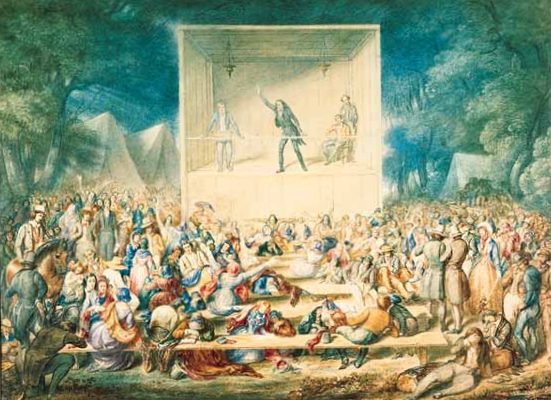This is part 1 in a series on contextualization. It first considers conventional evangelical views on contextualization and the need for a new perspective.
Part 2 will introduce a distinction between two kinds of contextualization. It concludes by explaining why it matters that we differentiate the two.
Finally, part 3 will illustrate four ways in which people “see” the world. Taken together, they reinforce the importance of perspective and worldview in doing contextualization. Just for fun, we’ll draw from the movie, The Matrix, to make the point.
Evangelical Views on “Contextualization” and the Need for a New Perspective
Context is king. This principle holds true in missions as much as it does for biblical interpretation. Whether we recognize it or not, we are creatures of context. In Rom 6, Paul says we all are either slaves to sin or slaves to righteousness. In the same way, we can acknowledge that we are slaves to our context(s).
Our context determines the language we use, our experiences, and our worldview, which includes our ways of thinking and judging the world. Within any context, actions have meaning to be understood according to the various implicit or explicit rules. Context governs interpretation; yet, humans either submit to or reject this king.
Paradoxically, Paul defines slavery to righteousness in terms of “freedom” (Rom 6:17–18). From one perspective, Paul says Christians are free; from another, he claims we are still slaves. In particular, those who are in Christ are reckoned “slaves of God” (Rom 6:20).
What does all this mean for contextualization?
For many years, evangelicals have debated the meaning and significance of this concept. There is consensus when it comes to principles. All agree that the biblical context reigns as the authority over any cultural context. The Bible judges culture, not vice versa.
Evangelicals close ranks against what they perceive to be threats against Scripture. For example, liberation theology has often been opposed precisely because many evangelicals judge it to contradict biblical authority. However, it is possible that a right desire to resist false doctrine can also conjure an unhealthy fear that limits the ability to contextualize the gospel.
Alert to human sin and the noetic effects of the Fall, one could become suspicious of theologies that emphasize cultural themes seemingly omitted or minimized in Scripture (at least according to traditional theologies). Evangelicals are keen to reiterate that there is one unchanging gospel, which is not bound by culture but rather transcends culture. Not surprisingly, it is easy to become overly conservative in the way one relates the Bible and culture. Many conservative Christians tend to see an inherent conflict between these two contexts.
In the attempt to shield interpretation from corrupting influence of culture, evangelicals try to be “objective,” separating the biblical text from the reader, and as a result neglect giving “attention to the cultural context of the contemporary reader.”[1] What results? Fear can quickly enslave those who seek to contextualize biblical truth.
How? One unwittingly becomes a slave to his or her own cultural context or theological tradition. This happens when a reader of the Bible does not realize how culture influences his or her interpretations. A mono-contextual perspective may subtly usurp the authority of the text. The individual’s cultural context reigns in the guise of orthodoxy. In the end, there is a danger that the very text that offers freedom becomes a tool that enslaves one to traditionalism and denominationalism.
Common Evangelical Perspectives
To order to avoid compromising Scripture, evangelicals tend to treat contextualization as a way of communication or application. After all, if there is only one gospel and the Bible is authoritative over human cultures, then, it is reasoned, contextualization does not change the meaning of Scripture. Certainly some people have paid attention to the relationship between contextualization and hermeneutics.[2] However, these few are not representative of typical evangelical thinking, which reduces contextualization to communication. Consequently, a foreign cultural context (relative to the missionary) plays little role in determining how one interprets the biblical text.
In what follows, I offer a sample of suggestions made by evangelicals who try to define contextualization. Countless articles and essays have been written on the subject. My immediate purpose is not to deny the truth in what they affirm. Instead, one should notice their agreement. Contextualization is defined in terms of communication not interpretation. David Hesselgrave and Edward Rommen offer a representative summary:
Christian contextualization can be thought of as the attempt to communicate the message of the person, works, Word, and will of God in a way that is faithful to God’s revelation, especially as it is put forth in the teachings of Holy Scripture, and that is meaningful to respondents in their respective cultural and existential contexts.[3]
Scott Moreau claims that evangelicals most commonly hold to a “translation” model of contextualization where “there is a core message of universal truth which must be translated into each 
Roy Musasiwa adds, “A conservative evangelical view of contextualization limits it to communicate the gospel message in a way that is both faithful to the Bible and meaningful to respondents in their respective cultural and existential contexts”[5] As another writer puts it, “Local theology, or contextualization, means articulating biblical faith using vernacular terms and engaging local issues.”[6]
Other evangelical scholars echo this view. Contextualization means “making concepts of ideals relevant in a given situation” (Byang H. Kato),[7] “the translation of the unchanging content of the Gospel of the kingdom into verbal form meaningful to the peoples in their separate culture” (Bruce J. Nicholls)[8] and “to discover the legitimate implications of the gospel in a given situation” (George W. Peters).[9]
Paul Hiebert regards contextualization foremost as communication not interpretation.[10] David Sills agrees by saying, “[C]ontextualization is simply the process of making the gospel understood.”[11] Kevin Greeson says contextualization tries “to adapt the style, form and language of the Christian faith and message to the culture of the people one is seeking to reach.”[12]
Fortunately, 
David Clarke correctly highlights a few problems with reducing contextualization to communication.[16] He describes the conventional evangelical perspective as that of 
Clarke says, “First, this model assumes that human expressions of transcultural principles can remain constant even as they change their attire in the cultural dressing rooms of different eras. . . . But principlizing obscures the facts that any articulation of the allegedly transcultural principles still reflects the culture of the translator.”
Second, the evangelical view “does not make clear that responsibility for contextualization lies with the peoples of the church in every culture, not primarily with cross-cultural missionaries.” In short, even though the traditional model highlights communication, it affords little opportunity for “dialogue.”[17]
(In Part 2, I’ll suggest an alternative perspective and distinguish two kinds of contextualization.)
Photo Credit: CC 2.0/Wikipedia
[1] David K. Clark, To Know and Love God: Method for Theology (Wheaton, Ill.: Crossway, 2003), 104.
[2] Among the best of these examples, see Chapter 3 of Clark, To Know and Love God.
[3] David J. Hesselgrave and Edward Rommen, Contextualization: Meanings, Methods, and Models (Grand Rapids, Mich.: Baker, 1989), 200.
[4] Scott Moreau, “Evangelical Models of Contextualization,” in Local Theology for the Global Church: Principles for an Evangelical Approach to Contextualization (ed by. Matthew Cook et al.; Pasadena, Calif.: William Carey Library, 2010), 169. He cites Stephen Bevans, Models of Contextual Theology (Rev. and expanded ed.; Maryknoll, N.Y.: Orbis Books, 2002), 37.
[5] Roy Musasiwa, “Contextualization,” in Dictionary of Mission Theology: Evangelical Foundations (ed. John Corrie, Juan F. Martinez, and Simon Chan; Downers Grove, Ill.: IVP Academic, 2007), 66.
[6] T. D. Gener, “Contextualization,” ed by. William A. Dyrness and Veli-Matti Kärkkäinen, Global Dictionary of Theology (Downers Grove, Ill.: IVP), 192.
[7] Byang H. Kato, “The Gospel, Cultural Context, and Religious Syncretism,” in Let the Earth Hear His Voice (ed by. J. D. Douglas; Minneapolis, Minn.: World Wide, 1975), 1217. Cited in Hesselgrave and Rommen, Contextualization, 33.
[8] Bruce J. Nicholls, “Theological Education and Evangelization,” in Let the Earth Hear His Voice (ed by. J. D. Douglas; Minneapolis, Minn.: World Wide, 1975), 647. Cited in Hesselgrave and Rommen, Contextualization, 33.
[9] George W. Peters, “Issues Confronting Evangelical Missions,” in Evangelical Missions Tomorrow (ed by. E. L. Frizen and Wade Coggins; Pasadena, Calif.: William Carey Library, 1977), 169. Cited in Hesselgrave and Rommen, Contextualization, 34.
[10] Paul Hiebert, “Cultural Difference and the Communication of the Gospel,” in Perspectives on the World Christian Movement: A Reader (ed by. Ralph Winter et al.; 3rd ed.; Pasadena, Calif.: William Carey Library, 1999), 373–83. Paul Hiebert, Anthropological Insights for Missionaries (Grand Rapids, Mich.: Baker, 1985), 186–90. Also, see Moreau, “Evangelical Models,” 174. Sills agrees that Heibert’s proposal mainly concerns appropriate applications of Scripture. See M. David Sills, Reaching and Teaching: A Call to Great Commission Obedience (Chicago, Ill.: Moody Publishers, 2010), 205–7.
[11] Sills, Reaching and Teaching, 195.
[12] Kevin Greeson, The Camel: How Muslims Are Coming to Faith in Christ! (Revised Edition.; Monument, CO: WIGTake Resources, 2010), 199–200.
[13] Dean Flemming, Contextualization in the New Testament: Patterns for Theology and Mission (Downers Grove, Ill.: IVP Academic, 2005), 19.
[14] Louis J. Luzbetak, The Church and Cultures: New Perspectives in Missiological Anthropology (Maryknoll, N.Y.: Orbis Books, 1988), 69. Cited in Susan S. Baker, “The Social Sciences for Urban Ministry,” in The Urban Face of Mission: Ministering the Gospel in a Diverse and Changing World (ed by. Manuel Ortiz and Susan S. Baker; Phillipsburg, N.J.: P & R Publishing, 2002), 75.
[15] Bruce Riley Ashford, “The Gospel and Culture,” in Theology and Practice of Mission: God, the Church, and the Nations (ed. Bruce Riley Ashford; Nashville, Tenn.: B & H Academic, 2011), Kindle Loc 3303–4. Emphasis original.
[16] Clark, To Know and Love God, 112–13. All citations in this paragraph come from these pages.
[17] For Clarke’s proposal for a “dialogical contextualization,” see Ibid., 113–22.
Related articles
- We Compromise the Gospel When We Settle for Truth (a new article) (www.patheos.com/blogs/jacksonwu)


















